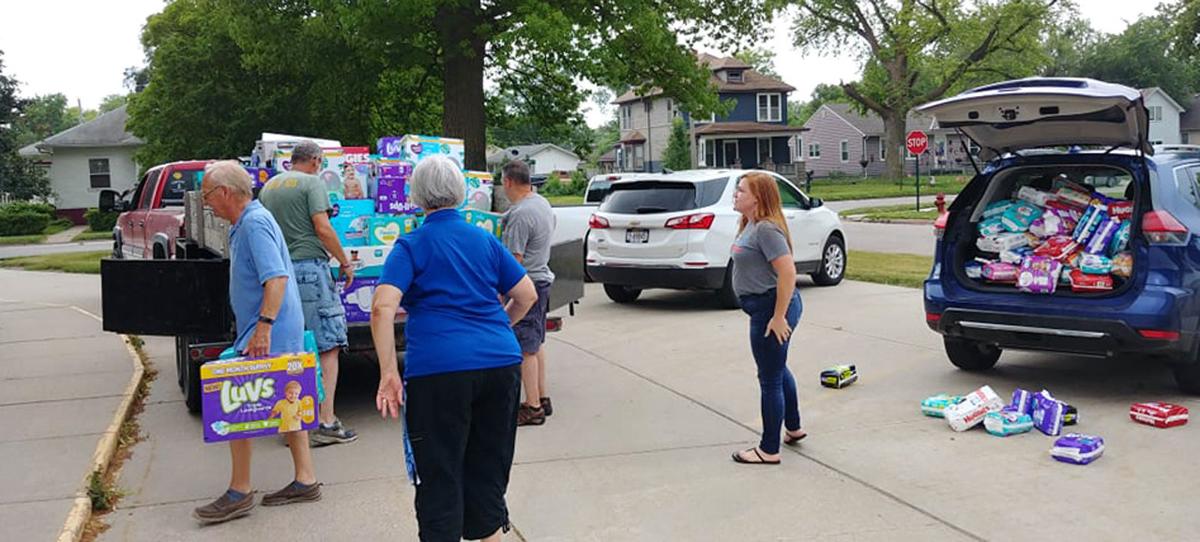
Press release from The Diaper Bank of CT:
Feb. 15, 2021
Public Funding Plays a Crucial Role in Getting Diapers to Families in Need
By Janet Stolfi Alfano
I've led The Diaper Bank of Connecticut for a decade, but there are still times I get a jolt of adrenaline when I walk through our North Haven warehouse.
With pallets piled high with diapers, and devoted staff and volunteers preparing them for distribution, the warehouse is the heartbeat of our organization. Sometimes I can't help but be amazed by it.
I'm in awe for two reasons: on one hand, I'm incredibly proud that we are distributing roughly 75,000 diapers each week, more than we ever have. On the other hand, I know it's not nearly enough - that we could distribute fives times as many diapers and still not meet the need in our community.
Too many in Connecticut can't afford an adequate supply of diapers for their infants and toddlers. Prior to COVID, one in three families experienced diaper need, and the pandemic has only exacerbated the problem. Diapers can cost $100 or more each month.
No parent or caregiver should ever have to wonder how they will afford diapers for their children. If we're going to ensure everyone has access to these basic health needs, increased public funding needs to be a critical piece of the puzzle.
Getting diapers to families that need them is the right thing to do. We serve low-income families which earn less than 200 percent of the federal poverty level; that's less than $52,000 a year for a family of four. In many cases, our recipients work - sometimes multiple jobs - but simply can't stretch their limited income to cover all their basic needs. They're forced to make unthinkable decisions, choosing between clean diapers and other expenses.
The Supplemental Nutrition Assistance Program (SNAP) and the Special Supplemental Nutrition Program for Women, Infants and Children (WIC) don't cover the cost of diapers; they weren't designed to. The only federal funds earmarked for diapers are through the Temporary Assistance for Need Families (TANF) program, but those funds typically are quickly eaten up by other necessities.
Aside from being the right thing to do, increasing public funding for diapers also makes smart financial sense. There are many interests competing for state and federal dollars these days, but allocating funds for diapers pays long-term dividends.
Some families that receive free diapers through our distribution network just need our help for a little while. A mother, for instance, might need diapers for a month or two, to help her through a rough patch until she's back on more solid ground. Without those diapers, she can't send her baby to childcare, which means she can't attend work or school. In addition to taking a huge mental and emotional toll, that will make it harder for her to break the cycle of poverty.
If we can get that mom the diapers she needs, alleviating that one burden for her, it can have an instant, meaningful impact. With those diapers she's more likely to get back on her feet, hopefully to a place where she is financially self-sufficient and less reliant on other public programs. Her baby, meanwhile, will be healthier, happier, and benefit from a stronger mother-child bond.
An adequate supply of diapers also reduces babies' chances of developing diaper rash, urinary tract infections and other medical problems. Research shows access to diapers can also reduce instances of child abuse, by eliminating a major household stressor. Providing diapers now prevents future need - and expense - further down the road, all while helping parents provide a more stable environment for the children.
As crucial as diapers are, we know people's needs for basic health items don't stop at toddlerhood. Period supply need is another serious problem in our community, which is why in 2020 we launched our Beam program as the Connecticut chapter of the Alliance for Period Supplies.
Pads and tampons are basic necessities, yet many can't afford them. Without access to period products, some individuals resort to using rags, toilet paper or even adult incontinence products. A lack of period supplies can lead to missed work and school.
Nationally, 1 in 5 low-income women reports missing work or similar commitments due to lack of access to period supplies, and 1 in 4 teens has missed school due to a lack of period supplies. In Connecticut, 40 percent of female public school students in grades 7 through 12 attend Title 1-eligible schools, which have high concentrations of student poverty.
As with diapers, getting period supplies to people who need them can improve mental health; prevent medical problems; and allow individuals to participate in the daily activities of school, work and social interactions.
But all this takes funding. Without additional money to buy more diapers and period products, we will never meet the need in Connecticut. We run the risk of seeing more families and individuals lose their financial footing and become trapped in a cycle of poverty - all while merely trying to access basic health needs.
To learn more about The Diaper Bank, and to get involved with our advocacy work, visit thediaperbank.org.
Janet Stolfi Alfano is the executive director of The Diaper Bank of Connecticut. The North Haven-based nonprofit works throughout Connecticut to provide access to basic health needs throughout people's lifespans.
This press release was produced by The Diaper Bank of CT. The views expressed here are the author's own.
February 16, 2021 at 04:46AM
https://ift.tt/3qoGoXv
Op-Ed Public Funding Plays Crucial Role In Distributing Diapers - Patch.com
https://ift.tt/2Comt7j
Diapers

No comments:
Post a Comment